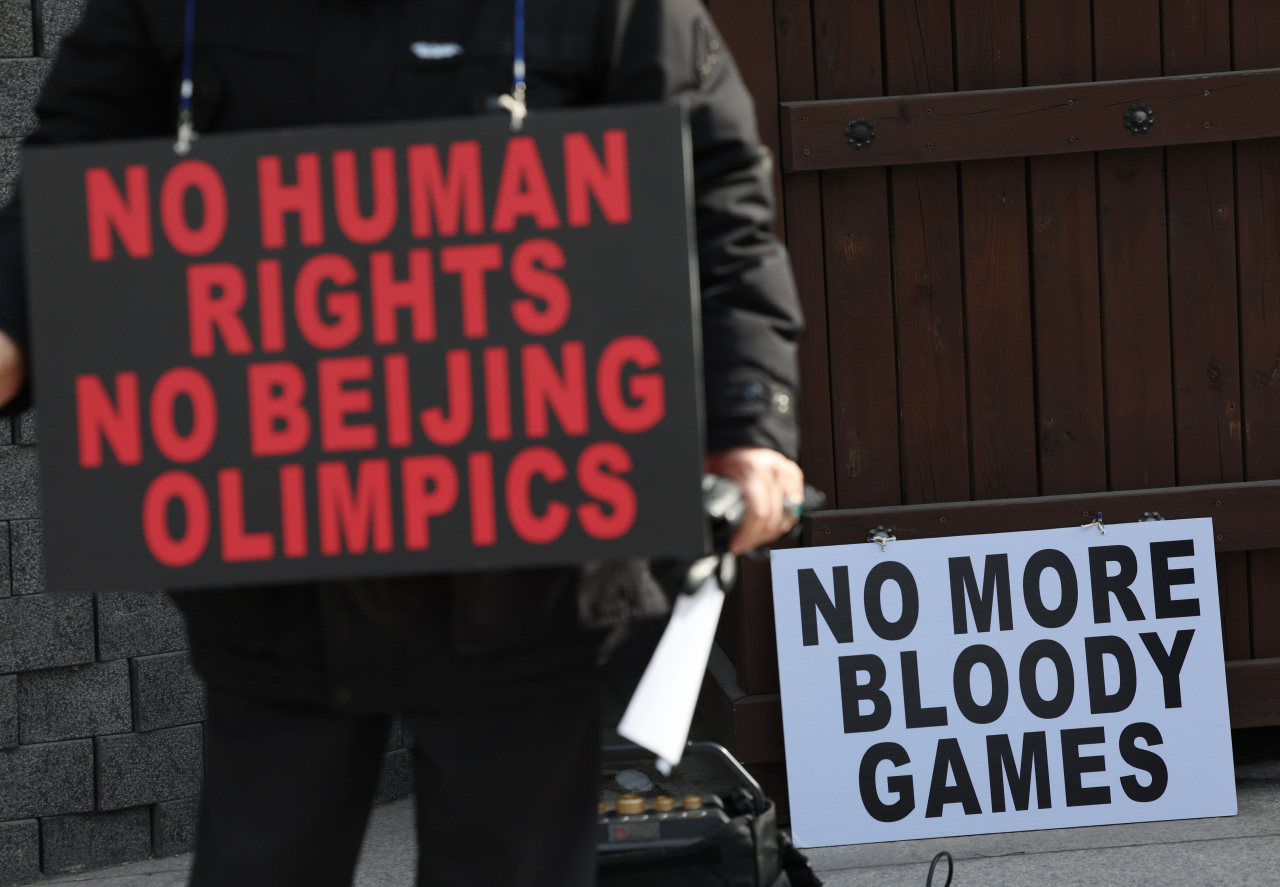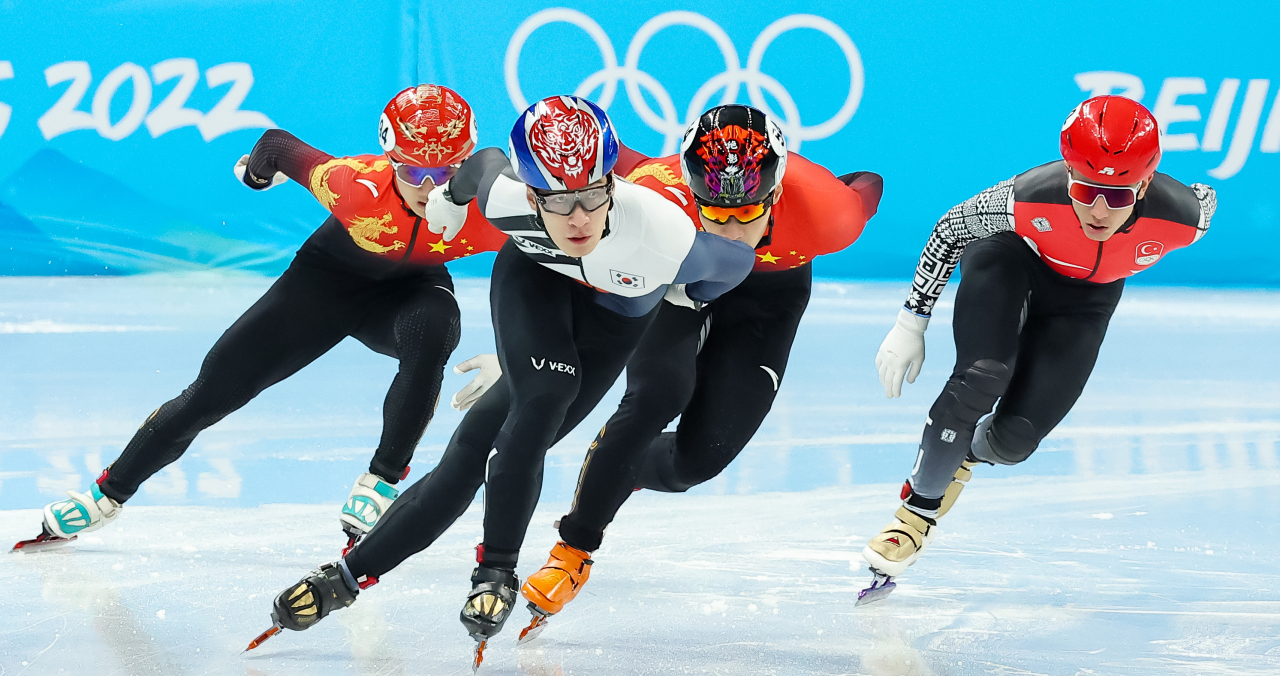Olympic-sparked anti-Chinese sentiment rises as political issue
By Jo He-rimPublished : Feb. 9, 2022 - 17:45

Anti-China sentiment sparked by controversial decisions at the 2022 Beijing Olympics is growing into a political issue, prompting presidential candidates to jump on the latest bandwagon to woo voters.
On Monday, Korean speedskaters Hwang Dae-heon and Lee June-seo were disqualified in different groups for the men’s 1,000-meter semifinals held at the Capital Indoor Stadium in China.
While they came in first and second in their respective group races, the two athletes were penalized and gave way to two Chinese skaters, as China ultimately collected gold and silver in the 1,000-meter finals.
Immediately after the race, presidential candidate Lee Jae-myung of the ruling Democratic Party of Korea quickly raised a voice against the refereeing.
“I am greatly disappointed and frustrated at the biased judgment in the short-track speedskating race,” Lee wrote via his Facebook on Tuesday.
In a separate post, Lee also expressed support for the Korean Sport & Olympic Committee’s decision to file an appeal with the Court of Arbitration for Sport of the referees’ decisions.
Yoon Suk-yeol, the rival candidate of the main opposition People Power Party, also said he “deeply sympathizes” with the anger and loss the Korean athletes would feel.
“I am concerned for the young Koreans who are greatly disappointed and question what impartiality is, seeing the Olympics incident,” Yoon said Tuesday, acknowledging the stronger anti-sentiment spread those in their 20s and 30s.
“But the Olympic spirit and sportsmanship of our athletes is of great value, and I hope they can do their best until the end.”
Ahn Cheol-soo of the minor opposition People’s Party, running a distant third in the presidential race, also posted a complaint on his Facebook on Tuesday.
“China should immediately cancel the ‘dirty’ judgment and return the gold medal to South Korea,” Ahn wrote.
Ahn said South Korean skaters have been robbed of the gold medal due to the biased refereeing in the short-track speedskating.

Amid growing anti-China sentiment, political pundits say the foreign policy directions of the presidential candidates may affect their support rating.
Lee of the liberal ruling party appears to hold a friendlier stance toward China than his conservativative rival Yoon. Yoon, on the other hand, has been taking a stance favoring the United States over China. And the two leading candidates had been criticizing each other for their differing stances.
Yoon’s conservative bloc would claim Lee and the ruling bloc hold a “pro-China” approach, while Lee’s campaign would call Yoon’s diplomacy stance as “populist.“
Lee has been stressing “balance” and “practicality” in his diplomatic policy pledges, in the country’s relationship with the neighboring countries and alliances -- putting almost equal importance on the United States and China.
Aware of the widespread desires for regime change, Lee stresses that his administration would be different from the current Moon Jae-in administration.
On defense and China, Lee maintains that Moon’s “Three Noes” policy is the right direction to go for economic cooperation with China.
Moon’s “Three Noes” policies include the promise that the country will not deploy additional Terminal High Altitude Area Defense batteries for national defense, integrate into the US-led regional missile defense system, nor participate in trilateral military cooperation with the US and Japan.
The government’s decision to deploy the first THAAD anti-missile system has led to a diplomatic clash between Seoul and Beijing in 2017, putting a serious dent in trade between the two countries.
Yoon, on the other hand, has been against the Moon administration’s inclination toward China and North Korea. He has stressed the importance of building a strong bond with the United States, and has only given strategic messages to maintain good ties with China.
He has also openly endorsed the idea of deploying additional THAAD systems for national defense.
In a poll by Hankook Research and South Korean online newspaper SisaIn released in June last year, China was the least favored country by the South Korean public, receiving worse scores than Japan and North Korea.
By Jo He-rim (herim@heraldcorp.com)








![[Hello India] Hyundai Motor vows to boost 'clean mobility' in India](http://res.heraldm.com/phpwas/restmb_idxmake.php?idx=644&simg=/content/image/2024/04/25/20240425050672_0.jpg&u=)










